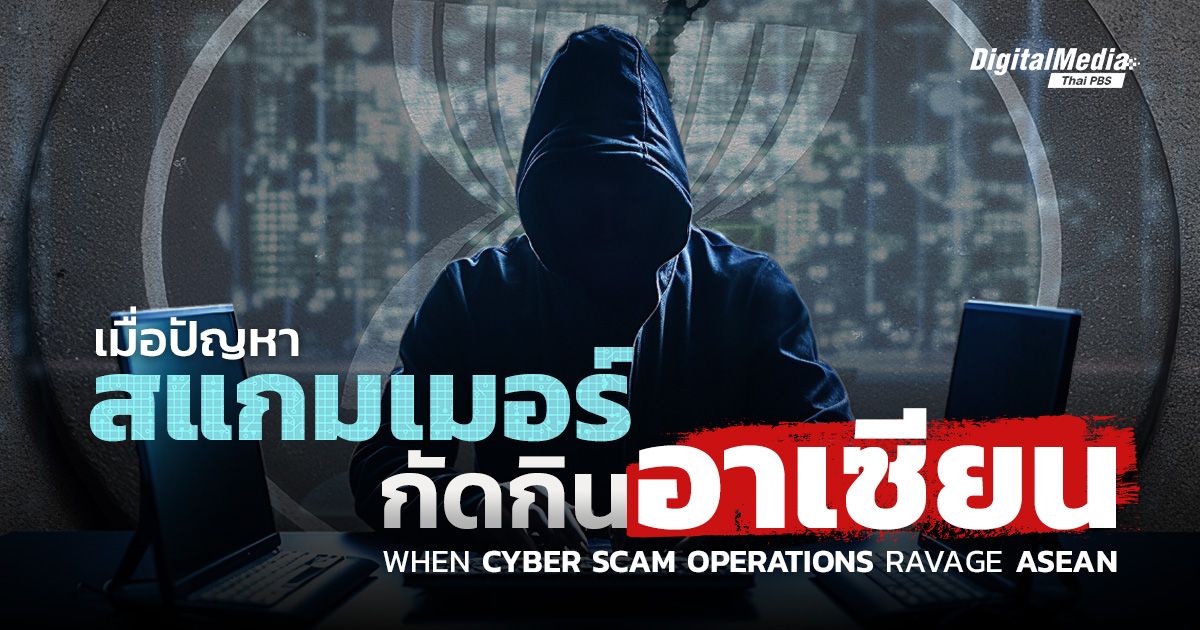ในช่วง 2-3 ปีที่ผ่านมา ประเทศอาเซียนถลำสู่ปัญหาสแกมเมอร์และการค้ามนุษย์มากยิ่งขึ้น ถือเป็นปัญหาที่ก่อความเสียหายและความสูญเสียให้ผู้คนมหาศาล อีกทั้งสร้างความกังวลไปทั่วโลก
Over the last few years, ASEAN countries have been increasingly associated with cyber scam operations and human trafficking, which cause immeasurable losses to many lives and have become an emerging global concern. [Scroll down to read the English text]
ทุกวันนี้ มีน้อยคนนักที่จะไม่เคยถูกแก๊งคอลเซนเตอร์หรือมิจฉาชีพติดต่อ เพราะคนกลุ่มนี้มักจะหามุกใหม่ ๆ ในการหลอกลวง ตั้งแต่ส่งของชอปปิงออนไลน์ผิด ปลอมหมายเรียก ไปจนถึงแผนลงทุนคริปโตปลอม แม้จะมีการส่งเสริมทักษะรู้เท่าทันสื่อ แต่ความเสียหายจากอาชญากรรมออนไลน์ก็ไม่ได้ลดน้อยลงไปทั้งในภูมิภาคและระดับโลก เมื่อปี พ.ศ. 2566 สำนักงานว่าด้วยยาเสพติดและอาชญากรรมแห่งสหประชาชาติ (UNODC) ระบุว่า ประเทศเอเชียตะวันออกและเอเชียตะวันออกเฉียงใต้สูญเสียเงินไปราว 37 พันล้านดอลลาร์สหรัฐจากคดีอาชญากรรมออนไลน์ หรืออย่างในสหรัฐฯ รัฐบาลอเมริกันประเมินว่า พลเมืองของตนเสียเงินไปไม่ต่ำกว่า 10,000 ล้านดอลลาร์สหรัฐให้แก๊งต้มตุ๋นในเอเชียตะวันออกเฉียงใต้
ส่วนในปีนี้ รายงานข่าวเกี่ยวกับฐานสแกมเมอร์ก็แสดงให้เห็นถึงสถานการณ์ที่รุนแรงขึ้นในประเทศอาเซียน อย่างเช่นเมืองเมียวดีและปอยเปตที่ปรากฏในสื่ออยู่บ่อยครั้ง ขณะที่ประเทศไทยเองก็กลายเป็น “ทางผ่าน” ไปยังเมืองทั้งสอง ไม่ใช่แค่ฐานแก๊งคอลเซนเตอร์จะหลอกเอาทรัพย์สินของคนธรรมดา แต่หลายที่ยังเป็นแหล่งค้ามนุษย์อีกด้วย คนจากรอบโลกจำนวนไม่น้อยตกเป็นเหยื่อถูกบังคับและถูกทรมานให้ทำงานเป็นนักต้มตุ๋นอีกทอดหนึ่ง จึงเกิดเป็นวงจรอุบาทว์ทางอาชญากรรมออนไลน์ในภูมิภาคไปโดยปริยาย
อย่างที่หลายคนทราบกันว่า ฐานแก๊งคอลเซนเตอร์และกลุ่มทุนเทาข้ามชาติ มีที่มั่นในกัมพูชา เมียนมา และไทยเป็นหลัก แต่สถานการณ์ในประเทศอาเซียนอื่น ๆ เป็นอย่างไรบ้าง แล้วจะทำอะไรได้บ้างเพื่อจัดการและหยุดยั้งกิจการผิดกฎหมายเหล่านี้ ทั้งในระดับภูมิภาคและระดับโลก ?
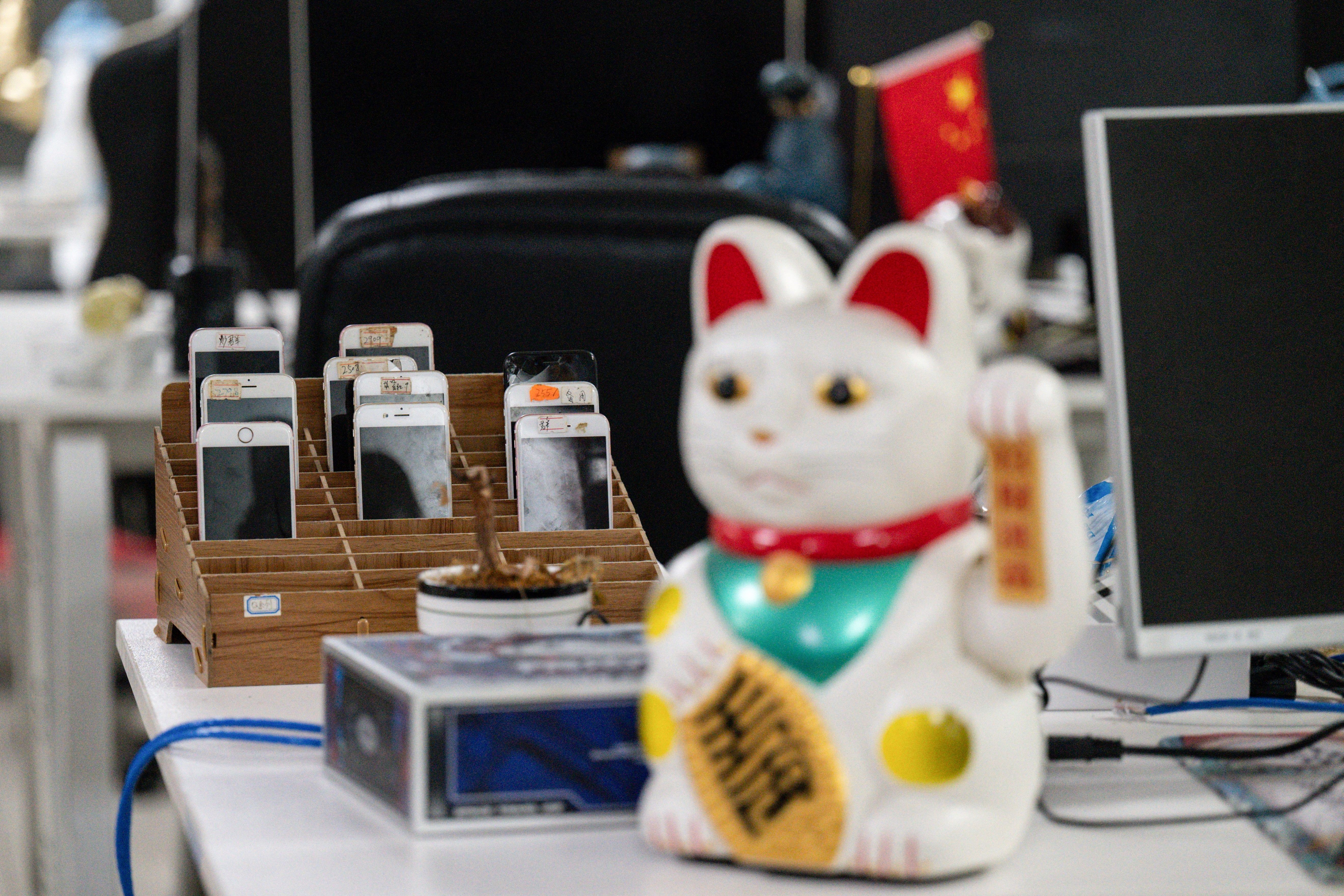
กลุ่มสแกมเมอร์ที่ลามไปไกลกว่าประเทศอาเซียน
รายงานนโยบายของ UNODC เมื่อปี 2566 ระบุว่า ศูนย์กลางอาชญากรรมไซเบอร์และการค้ามนุษย์เพื่อบังคับให้ทำผิดกฎหมายตั้งอยู่ “อย่างชัดแจ้ง” ในกัมพูชา เมียนมา และสปป.ลาว โดยทั่วไปแล้ว ฐานแก๊งคอลเซอร์กัมพูชาและเมียนมาจะเปิดอยู่ในกาสิโน โรงแรม หรือโครงการพัฒนาอสังหาริมทรัพย์ต่าง ๆ แต่ความแตกต่างอยู่ตรงที่กลุ่มอาชญากรในเมียนมาจะสร้างตึกอาคารขึ้นมาใหม่เพื่อดำเนินงานหลอกลวงและเป็นที่พำนักของเหยื่อค้ามนุษย์ ขณะที่ในกัมพูชานั้น มีแนวโน้มที่จะดัดแปลงปรับปรุงโครงสร้างเดิมที่มีอยู่แล้ว
สำหรับประเทศไทย แต่เดิมนั้นเป็นจุดหมายปลายทางของขบวนการค้ามนุษย์ ทว่าในช่วงไม่กี่ปีที่ผ่านมา ก็กลายเป็นทั้งประเทศจุดเริ่มต้นและทางผ่านของการค้ามนุษย์เพื่อบังคับก่ออาชญากรรมด้วย เมืองชายแดนอย่าง อ.แม่สอด จ.ตาก และอ.อรัญประเทศ จ.สระแก้ว ถูกใช้เป็นจุดส่งตัวเหยื่อชาวต่างประเทศข้ามผ่านแดนไปยังเมียนมาและกัมพูชาตามลำดับ แม้แต่คนไทยและเด็กไทยเองก็เป็นส่วนหนึ่งของการทำงานเป็นสแกมเมอร์ บางคนรับจ้างเปิดบัญชีม้า และบางคนก็เป็นนอมินีให้กลุ่มทุนสีเทาในเมืองไทย
ลักษณะทางกายภาพของเมืองชายแดนนั้นเป็นประโยชน์ต่อสมาชิกแก๊งคอลเซนเตอร์ นักค้ามนุษย์ และคนลักลอบขนส่งผิดกฎหมาย เพราะพื้นที่ชายแดนไม่เคยหยุดนิ่งหลับใหล ถึงจะมีด่านตรวจและระบบรักษาความปลอดภัยต่าง ๆ ใคร ๆ ก็ยังสามารถ “เดินเท้า” ข้ามแดนระหว่าง 2 ประเทศได้ “บางครั้ง [อาชญากร] ก็มีจังหวะโอกาสที่ดีในการหลอกลวงคนที่อยู่ฝั่งโน้น แล้วอยากจะข้ามแดนไปมา บางครั้งก็ใช้สาธารณูปโภคจากฝั่งประเทศไทย เช่น การส่งกระแสไฟฟ้า สัญญาณอินเทอร์เน็ต อะไรต่าง ๆ ก็ทำให้แก๊งคอลเซนเตอร์อยู่ได้ อันนี้คือความสะดวกของพื้นที่ชายแดน” รศ.ดร.ดุลยภาค ปรีชารัชช อาจารย์ประจำสาขาเอเชียตะวันออกเฉียงใต้ศึกษา มหาวิทยาลัยธรรมศาสตร์ อธิบายไว้ในรายการ Back To Basics เมื่อเดือนตุลาคม 2568
ขณะที่กัมพูชา เมียนมา และไทยจะเป็น “ตัวละครหลัก” ในปัญหาสแกมเมอร์ สถานการณ์อาชญากรรมออนไลน์ในมาเลเซียและฟิลิปปินส์นั้นก็น่าวิตกขึ้นเช่นกัน ในช่วงไตรมาสแรกของปี 2568 มีรายงานต้มตุ๋นออนไลน์เกี่ยวกับออนไลน์ชอปปิง การปล่อยเงินกู้ปลอม และการลงทุนเก๊แล้วกว่า 12,110 คดี คิดเป็นมูลค่าความเสียหายอยู่ที่ 573.7 ล้านริงกิต และองค์กรอาชญากรรมกระจายตัวไปทั่วทั้งประเทศ อาทิ ลังกาวี และยะโฮร์ แม้จะไม่มีฐานที่มั่นที่แน่ชัดก็ตามที
ฟิลิปปินส์เองก็กำลังเผชิญกับปัญหาสแกมเมอร์มากขึ้น เมื่อปี 2567 มีคดีหลอกลวงทางออนไลน์อยู่ร้อยละ 44 จากคดีไซเบอร์ทั้งหมด 14,531 คดีของตำรวจปราบปรามอาชญากรรมออนไลน์ และเครือข่ายอาชญากรรมในประเทศได้ขยายตัวขึ้นโดยใช้ ‘กิจการพนันออนไลน์ที่ให้บริการแก่ลูกค้านอกประเทศ (POGO)’ เป็นฉากบังหน้า กลุ่มผู้ให้บริการ POGO หลายเจ้าใช้ที่ทำการของตัวเองเพื่อต้มตุ๋นทางอินเทอร์เน็ต ค้ามนุษย์ และฟอกเงิน แม้ประธานาธิบดีเฟอร์ดินานด์ มาร์กอส จูเนียร์ กำลังยกเลิกใบอนุญาต POGO ทั้งหมด กลุ่มอาชญากรรมบางกลุ่มก็ยังใช้มุก “เปิดรับสมัครงานสไตล์ POGO ในต่างประเทศ” พร้อมรายได้ดี เพื่อล่อลวงคนฟิลิปปินส์ไปทำงานในแก๊งคอลเซนเตอร์ในต่างแดน
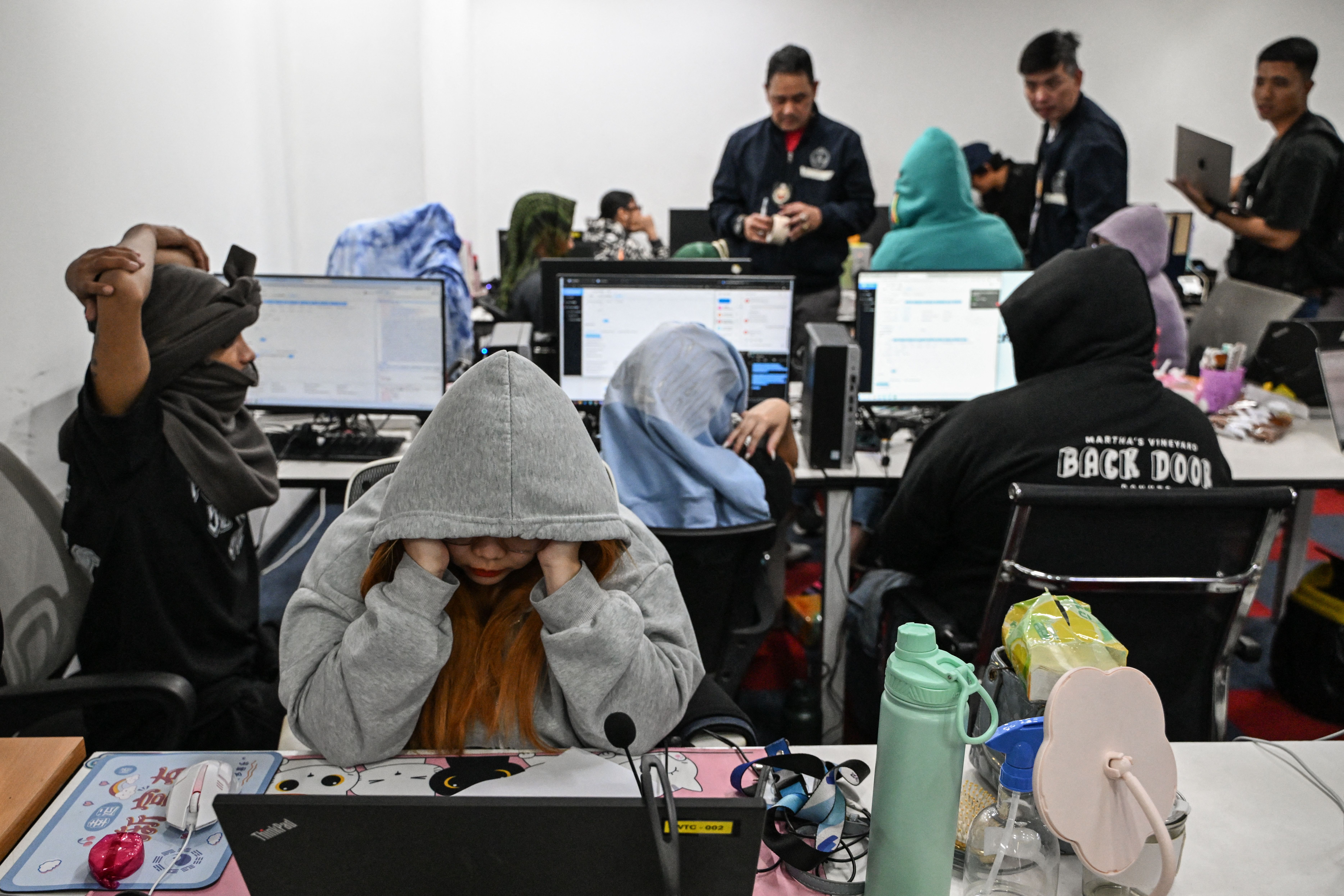
นอกจากนี้ เครือข่ายอาชญากรรมจากเอเชียตะวันออกและเอเชียตะวันออกเฉียงใต้ยังขยายตัวไปยังภูมิภาคอื่น ๆ โดยเล็งตกเหยื่อทั้งในท้องถิ่นและนานาชาติ ตัวอย่างเช่น สาธารณรัฐอาหรับเอมิเรตส์ถูกกล่าวว่าเป็นแหล่งฟอกเงินพร้อมกับ “ศูนย์คัดเหยื่อและค้ามนุษย์ที่เกี่ยวข้องกับอุตสาหกรรมฉ้อโกงทางไซเบอร์” ชาวเอเชียตะวันออกเฉียงใต้จำนวนหนึ่งถูกคนเอเชียที่ตั้งฐานในดูไบ หลอกกันเองเพื่อให้ไปทำงานสแกมเมอร์ในเปรูหรือไนจีเรีย โดยเฉพาะไนจีเรียนั้นได้กลายเป็นจุดหมายสำคัญของแก๊งอาชญากรรมเอเชียในทวีปแอฟริกา ถึงจะมีอุตสาหกรรมต้มตุ๋นฉ้อโกงในท้องถิ่นมานานแล้วก็ตาม
บราซิลก็เป็นอีกประเทศหนึ่งที่เจอกับความท้าทายจากอาชญากรรมไซเบอร์ แม้จะอนุญาตและพยายามควบคุมแพลตฟอร์มพนันออนไลน์ได้ แต่ก็ยังมีแพลตฟอร์มพนันผิดกฎหมาย – ซึ่งเกี่ยวข้องหรือดำเนินงานโดยชาว -เอเชียจากนอกประเทศ – เข้าถึงนักเล่นในบราซิลอยู่ เมื่อเดือนสิงหาคม 2567 ผู้ให้บริการพนันออนไลน์ผิดกฎหมายในแองโกลามีเกมพนันกว่า 400 เกม และมีจำนวนไม่น้อยที่ฝังมัลแวร์ไว้ขุดข้อมูลส่วนตัวของลูกค้า อีกทั้งมีชาวบราซิลตกเป็นเหยื่อมากขึ้นเรื่อย ๆ จากประกาศรับสมัครงานปลอมและขบวนการค้ามนุษย์เพื่อบังคับให้ก่ออาชญากรรม ซึ่งท้ายที่สุดต้องมาถูกขู่เข็ญให้ทำงานในฐานแก๊งคอลเซนเตอร์ในเมียนมาหรือที่อื่น ๆ ในภูมิภาคอาเซียน
เช่นนี้ กลุ่มสแกมเมอร์จึงกลายเป็นภัยความมั่นคงระหว่างประเทศรูปแบบใหม่ และไม่มีประเทศใดที่ควรละเลยเมินเฉยในการจัดการและแก้ไขปัญหาอาชญากรรมข้ามชาติ แต่คำถามที่ตามมาก็คือ ประเทศในอาเซียนนั้นเต็มใจและร่วมมือกันมากแค่ไหนที่จะร่วมกันรับมือเรื่องนี้ในภูมิภาค ?
มาตรการป้องกันและ ‘หน่วยจับตา’ ปัญหาสแกมเมอร์
เนื่องจากกลุ่มสแกมเมอร์ในเอเชียตะวันออกเฉียงใต้ได้สร้างความเสียหายไปทั่วโลก หลายประเทศจึงพยายามตอบโต้กับแก๊งอาชญากรรมเหล่านี้ อย่างในช่วงปีที่ผ่านมา สหรัฐฯ ได้คว่ำบาตรบุคคลและกลุ่มต่าง ๆ ที่เกี่ยวพันกับกลุ่มสแกมเมอร์ในชเวโก๊กเก่และฐานแรงงานที่ถูกบังคับขู่เข็ญในกัมพูชา และสหรัฐฯ เองก็ร่วมมือกับสหราชอาณาจักรในการใช้มาตรการคว่ำบาตรเป้าหมายในปรินซ์กรุ๊ป พร้อมตัดกลุ่มฟอกเงิน Huione ออกจากระบบการเงินอเมริกัน
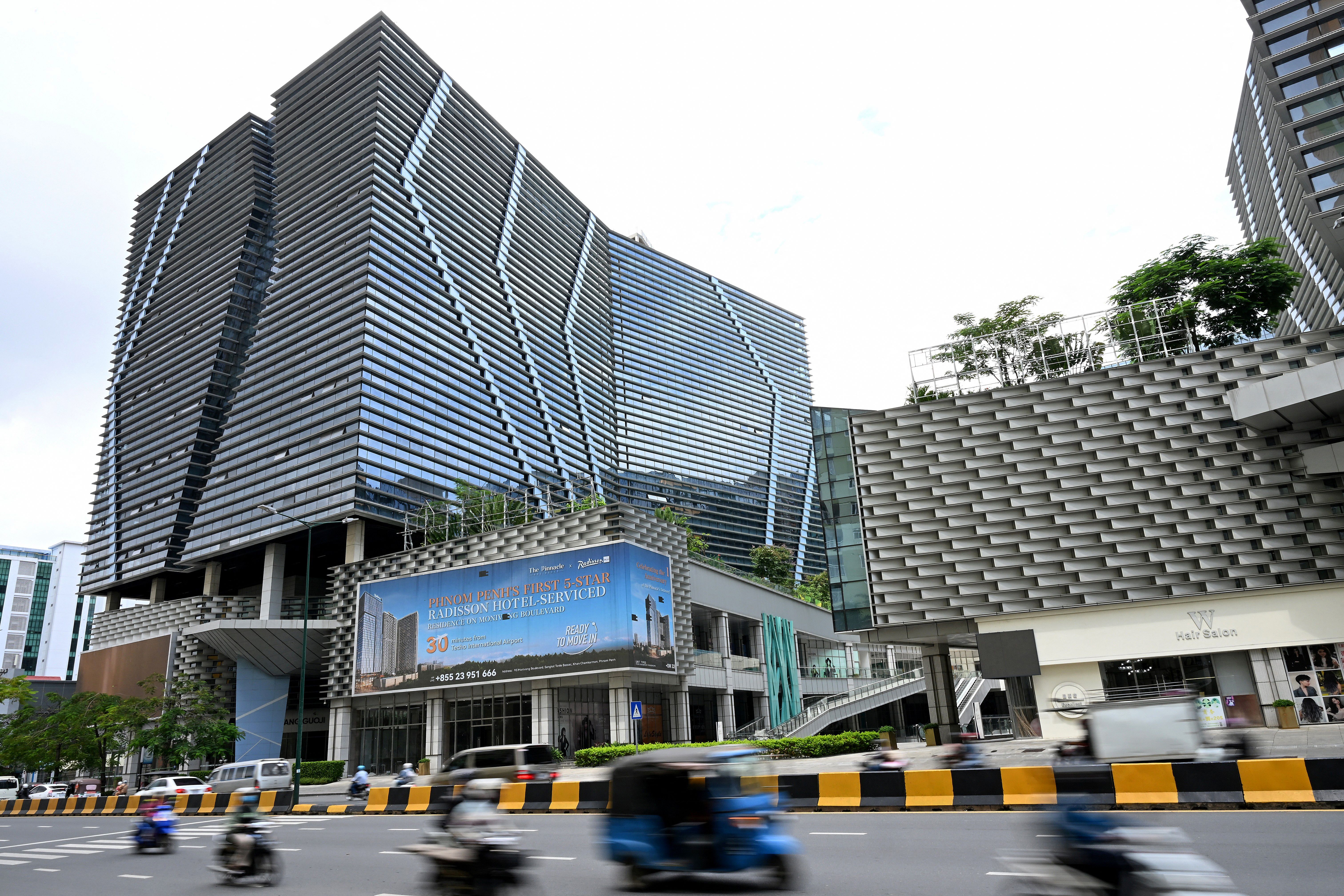
ส่วนประเทศจีนนั้นก็ดำเนินงานปราบปรามแก๊งอาชญากรรมจีนที่หลอกลวงเพื่อนร่วมชาติ เมื่อต้นเดือนพฤศจิกายน 2568 ที่ผ่านมา ทางการจีนได้สั่งประหารสมาชิกแก๊งมาเฟีย 5 คน ซึ่งมีสมาชิกตระกูลไป๋ 2 คนรวมอยู่ด้วย อีกทั้งยังสั่งจำคุกสมาชิกครอบครัวไป๋อีก 21 คนในข้อหาต่าง ๆ ได้แก่ ฉ้อโกง ฆาตกรรม และฐานความผิดอื่น ๆ ขณะที่เกาหลีใต้เองได้นำตัวพลเมืองที่ถูกลักพาตัว ถูกกักขังหน่วงเหนี่ยว หรือเต็มใจมีส่วนร่วมในการกระทำผิดกฎหมาย กลับจากกัมพูชาหลังจากที่มีนักศึกษาเกาหลีเสียชีวิต และเกาหลีใต้ยังมุ่งมั่นในการร่วมมือกับประเทศอาเซียนเพื่อปราบปรามเครือข่ายอาชญากรรมไซเบอร์ข้ามชาติ
อาเซียนเองก็แสดงความมุ่งมั่นในการจัดการกับกลุ่มสแกมเมอร์ออนไลน์และการค้ามนุษย์ที่เพิ่มขึ้นในภูมิภาค ผ่านกลไกต่าง ๆ เช่น แผนปฏิบัติการเพื่อต่อต้านอาชญากรรมข้ามชาติ (ASEAN Plan of Action in Combatting Transnational Crime) ปฏิญญาอาเซียนว่าด้วยการต่อต้านการลักลอบขนส่งมนุษย์ในเอเชียตะวันออกเฉียงใต้ (ASEAN Declaration on Countering People Smuggling in Southeast Asia) และปฏิญญาอาเซียนว่าด้วยการต่อต้านอาชญากรรมไซเบอร์และการหลอกลวงออนไลน์ (ASEAN Declaration on Combatting Cybercrime and Online Scams) อีกทั้งยังมีการบุกทลายรังแก๊งคอลเซนเตอร์อยู่บ่อยครั้ง ซึ่งมักจะร่วมมือกับประเทศอื่น ๆ เพื่อตัดแหล่งทรัพยากร จับกุมสมาชิกในขบวนการ หรือช่วยเหลือเหยื่อนานาชาติ
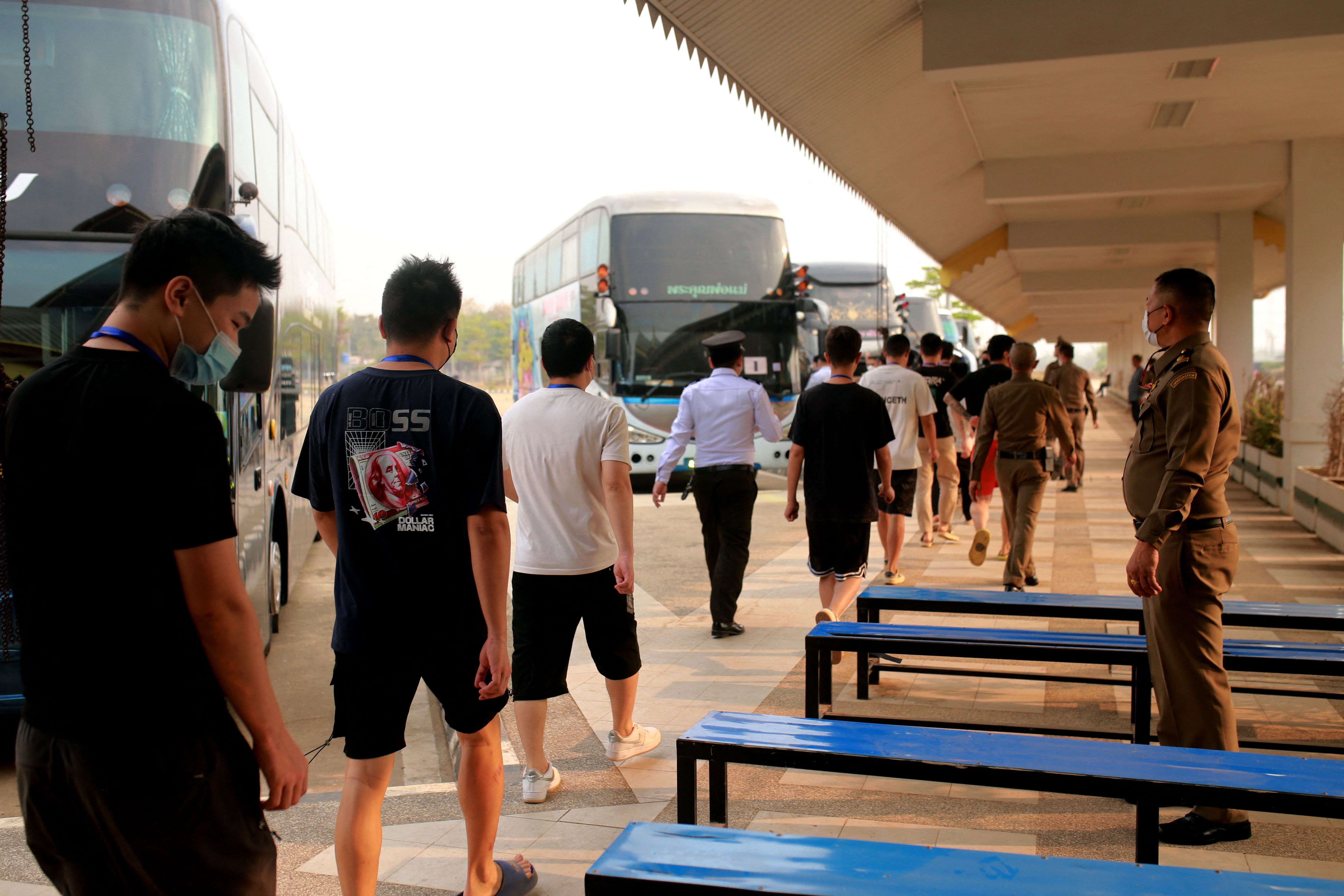
อย่างไรก็ตาม บางคนตั้งคำถามถึงประสิทธิภาพความพยายามระดับภูมิภาค เพราะฐานแก๊งคอลเซนเตอร์หลายแห่งยังคงดำเนินงานอยู่ และหาทางปรับตัวได้เสมอ รศ.ดร.ดุลยภาค ระบุถึงอุปสรรคหลัก ๆ 3 ประการเกี่ยวกับการทลายปฏิบัติการสแกมเมอร์ในกลุ่มประเทศอาเซียน ได้แก่ หลักการไม่แทรกแซงกิจการภายในต่อกันและกัน การขาดกฎหมายลงโทษประเทศสมาชิกที่ทำผิด และวัฒนธรรมด้านธรรมาภิบาลที่ไม่แข็งแรง
ผมว่ามันก็แก้ได้เป็นเปลาะ ๆ แต่ว่าแก้ปัญหา ขจัดฐานราก แล้วพัฒนายั่งยืน... เป็นไปได้ยากครับ […] มันไม่ได้มีบทลงโทษรัฐที่กระทำความผิดในเรื่องอาชญากรรมข้ามชาติ สุดท้ายมันก็ต้องอยู่กันไปแบบนี้ - รศ.ดร.ดุลยภาค ปรีชารัชช
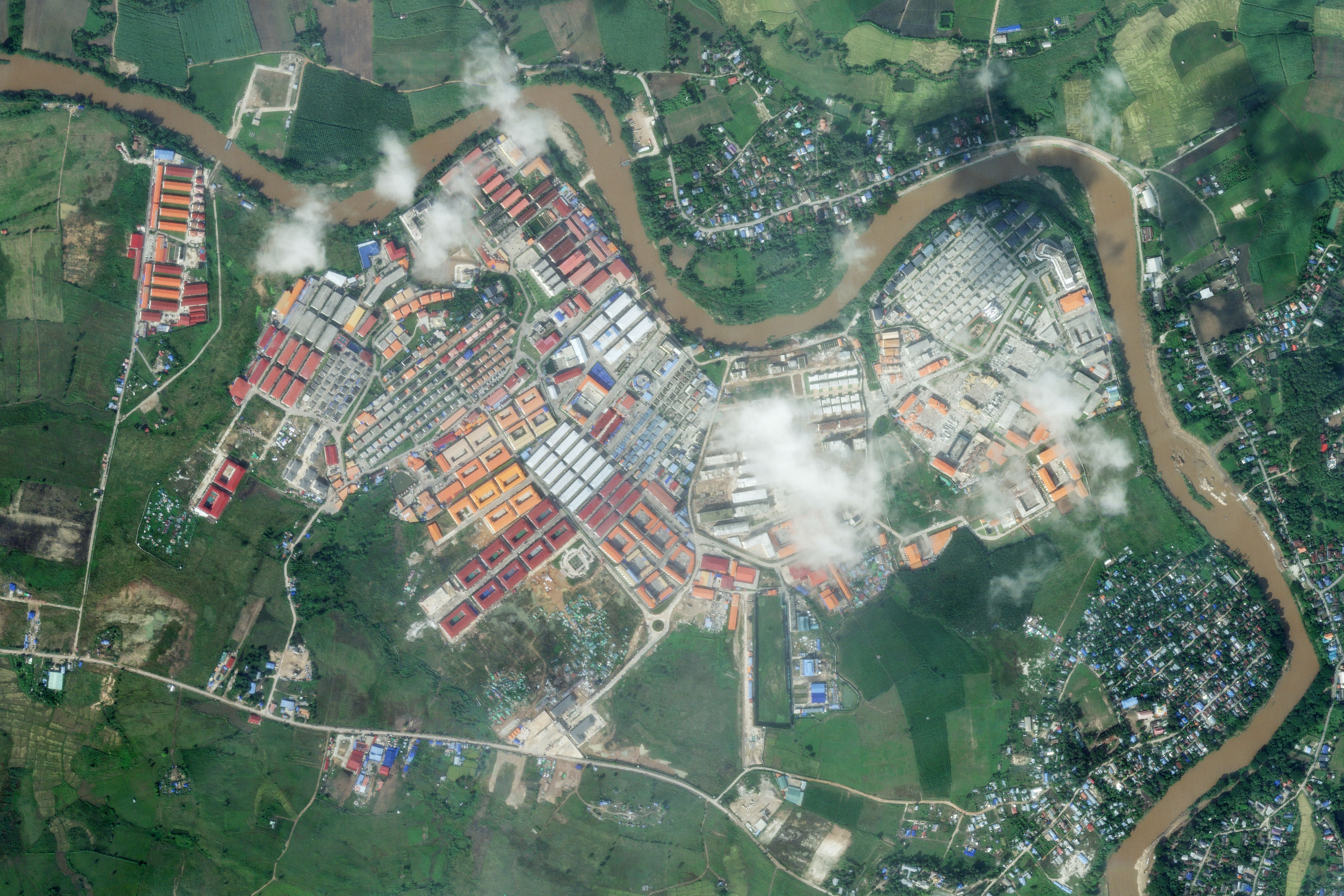
ทั้งนี้ทั้งนั้น ลำพัง เจ้าหน้าที่ทางการไม่สามารถแก้ไขกับแก๊งอาชญากรรมข้ามชาติไปพร้อม ๆ กับสร้างความตระหนักรู้ในสังคมได้แค่กลุ่มเดียว สื่อจึงเข้ามามีบทบาทในการช่วยรับมือปัญหานี้ ไม่เพียงแต่สำนักข่าวและสตูดิโอต่าง ๆ จะสามารถปลูกฝังความรู้เท่าทันสื่อและความสงสัยใคร่รู้ให้แก่ประชาชน แต่ยังถามภาครัฐและรัฐบาลกลับได้เช่นกันว่า มีมาตรการและนโยบายอะไรที่จะจบปัญหาสแกมเมอร์ระบาดทั้งในประเทศและภูมิภาค
“คดีสแกมเมอร์พวกนี้เกิดขึ้นบ่อยครั้งครับ บางครั้ง เวลามีข่าวแบบนี้ออกมา ผู้คนก็คงคิดว่า ‘โอเค มีเรื่องสแกมเมอร์มาอีกแล้ว’ ดังนั้น คุณต้องหาชั้นเชิงในการเล่าข่าวและเขียนเนื้อหาให้คนรู้สึกสนใจมากขึ้นครับ เพราะคุณไม่อยากจะสั่งสอนพวกเขาหรอก” มุฮัมมัด ฮาซีก ซาฮีด บรรณาธิการข่าวภาคภาษาอังกฤษจาก RTM และ Thai PBS Fellow ประจำปี 2568 กล่าว “แทนที่จะปล่อยให้ทางการพูด เรา [สื่อ] ก็ทำหน้าที่นี้เสีย เราต้องเล่นกับเฉดระดับคำเพื่อดึงความสนใจของคนก่อนครับ จากนั้น ถึงจะเริ่มถักทอสารที่จะสื่ออย่างค่อยเป็นค่อยไปครับ”
ซาฮีดยังกล่าวถึง “ความร่วมมือแบบที่ไม่ต้องพูดกัน” ระหว่างสื่อของรัฐและสื่อพาณิชย์ในการต่อสู้กับปัญหาสแกมเมอร์ในมาเลเซีย “สำหรับพวกเราที่ RTM เราเป็นสื่อของรัฐครับ ดังนั้น เราทำแคมเปญรณรงค์ต่าง ๆ และร่วมมือกับ MCMC [คณะกรรมาธิการสื่อสารมวลชนและมัลติมีเดียมาเลเซีย] เรารณรงค์เรื่องนโยบายต่าง ๆ และสื่อเอกชนก็เข้ามาถามคำถาม [ในนามของประชาชน] ว่า ‘ได้ดำเนินการความร่วมมือนั้นนี้กับประเทศอาเซียนอื่น ๆ หรือยัง?’ หรือ ‘นโยบายนี้จับต้องได้จริงหรือ?”
ดังนั้น ผมคิดว่า ความร่วมมือคือกุญแจในการต่อสู้กับเรื่องนี้ครับ – มุฮัมมัด ฮาซีก ซาฮีด
จอห์น มาร์วิน เอเลา โปรดิวเซอร์ฝ่ายโซเชียลมีเดียของ Philstar Global Corp. ประเทศฟิลิปปินส์ และ Thai PBS Fellow ได้พูดถึงการร่วมมือกันของสื่อต่าง ๆ เพื่อช่วยต่อสู้กับปัญหาแก๊งคอลเซนเตอร์ “ที่องค์กรของผม เราจัดทำซีรีส์ข่าวซึ่งร่วมมือกับสำนักข่าวอื่น ๆ ในฟิลิปปินส์ครับ เราจัดทัวร์หรือแคมเปญที่มหาวิทยาลัยเพื่อพูดคุยถึงเรื่องข้อมูลบิดเบือนและสิ่งที่กำลังเกิดขึ้นในประเทศ ผมคิดว่า เราไม่ได้แข่งกันเองนะครับ แต่ตั้งใจช่วยให้ผู้คนเข้าใจถึงสถานการณ์ที่เกิดขึ้นในบ้านและรอบโลก” เขากล่าว
โดยพื้นฐานแล้ว ข่าวคือบริการสาธารณะครับ การเป็นคนทำข่าว [ก็หมายความว่า] เป็นหูตาสอดส่องการทำงานของรัฐบาลด้วย – จอห์น มาร์วิน เอเลา
การผลิตละครก็เป็นอีกวิธีหนึ่งในการกระตุ้นความตระหนักรู้ถึงภัยสแกมเมอร์และกลเม็ดหลอกลวงใหม่ ๆ อย่างในฟิลิปปินส์นั้น มีพลเมืองหลายคนตกเป็นเหยื่อประกาศรับสมัครงานต่างประเทศ จึงมีซีรีส์ที่อิงจากเรื่องราวที่เกิดขึ้นจริงฉายบนโทรทัศน์ “เรามีช่องทีวีช่องหนึ่งที่ออกอากาศซีรีส์ดรามาจากผู้หญิง [ที่เคยไปทำงานในฐานสแกมเมอร์เมียนมา] แล้วผู้ชมก็ให้การตอบรับที่ดีครับ” เอเลายกตัวอย่าง “มันสร้างความตระหนักรู้ว่า การหลอกลวงแบบนี้กำลังเกิดขึ้น และไม่ควรตกหลุมพราง โดยเฉพาะคนฟิลิปปินส์ที่อยากเดินทางออกจากประเทศเพื่อหาโอกาสและงานที่ดีกว่าครับ”
ส่วนในประเทศไทย ก็มีสื่อและภาคีเครือข่ายก็ร่วมกันสร้างภูมิคุ้มกันภัยไซเบอร์ให้แก่ประชาชนทั้งในรูปแบบออฟไลน์และออนไลน์อย่างต่อเนื่อง เช่น กองบัญชาการตำรวจสอบสวนกลาง (CIB) ที่ออกไปจัดกิจกรรมเตือนภัยตามสถานศึกษาร่วมกับหน่วยงานสื่อ หรือโคแฟค (Cofact) และ Thai PBS Verify ซึ่งส่งเสริมทักษะรู้เท่าทันสื่อและตรวจสอบข่าวในสังคมไทย ส่วนสื่อสาธารณะของไทยนั้นมีศูนย์ร้องทุกข์ที่พร้อมช่วยเหลือผู้เสียหายจากแก๊งคอลเซนเตอร์ และบริการ Data Visualization ที่เล่าเรื่องซับซ้อนอย่างสแกมเมอร์ให้เข้าใจง่ายผ่านภาพ เสียง วิดีโอ และเกม
สแกมเมอร์ได้กลายเป็นภัยที่ร้ายแรงที่สุดอย่างหนึ่งต่อความมั่นคงระหว่างประเทศ แน่นอนว่า ต้องมีมาตรการและการปราบปรามอย่างเป็นรูปธรรมเพื่อล้มเครือข่ายอาชญากรรมที่มีถิ่นฐานหรือเกิดขึ้นในประเทศอาเซียน แต่ท้ายที่สุดแล้ว ความจริงใจ ความมุ่งมั่นทุ่มเท และการประสานความร่วมมือกัน จะเป็นปัจจัยหลักในการป้องกันความเสียหายในอนาคตได้อย่างยั่งยืน
จากเหยื่อหลักร้อย กลายเป็นหลักล้าน ! เจาะลึกแก๊งสแกมเมอร์ในรูปแบบ Data Visualization กับ “THE SCAMMER CLICK • PAY • CRY : กฎข้อเดียวของเกมนี้ = อย่าเชื่อใจใคร” คลิกอ่านและเล่นเกมได้ที่: www.thaipbs.or.th/TheVisualScammer
We all must have been once contacted by scammers and fraud operators as these perpetrators always find new tricks to lure victims, for instance, false shopping deliveries, forged warrants and cryptocurrency trading. While media literacy is encouraged among the public, the damage of cybercrime originating in Asia does not lessen both regionally and globally. UNODC indicated that East and Southeast Asian countries lost up to an approximate $37 billion to cyber-enabled fraud in 2023. Americans alone lost at least $10 billion to scam operations in Southeast Asia in 2024, according to a U.S. government estimate.
This year, news coverage on scam hubs has emphasized the aggravated situation of internet fraud in ASEAN countries. Myanmar’s Myawaddy and Cambodia’s Poipet – just to name a few – often appear on the news, with Thailand depicted as a major transit country to these cities. Not only are scam centers operated to deceive people for their money, but many also serve as compounds of trafficking. Thousands of internationals fall victims to human trafficking rings of ‘forced criminality,’ treated inhumanely and threatened to work as online scammers. Hence, a vicious cycle of present-day cybercrime in Southeast Asia.
As you may know, major cyber scam operations and transnational grey businesses are principally active in Cambodia, Myanmar and Thailand. But how are the situations in some other ASEAN countries? What can we do to tackle and prevent such illegal activities in our region and the rest of the world?
Cyber scam operations within and beyond ASEAN countries
Stated in the 2023 UNODC Policy Report, there are “clearly” hubs for cybercrime and trafficking for forced criminality in Cambodia, Myanmar and Lao PDR. Generally, scam compounds both in Myanmar and Cambodia are located in casinos, hotels or land development projects. Organized crime groups in Myanmar have new multipurpose facilities built to commit fraud and accommodate trafficking victims. Those in Cambodia, however, tend to “simply” modify existing structures on the premises and use them as scam centers.
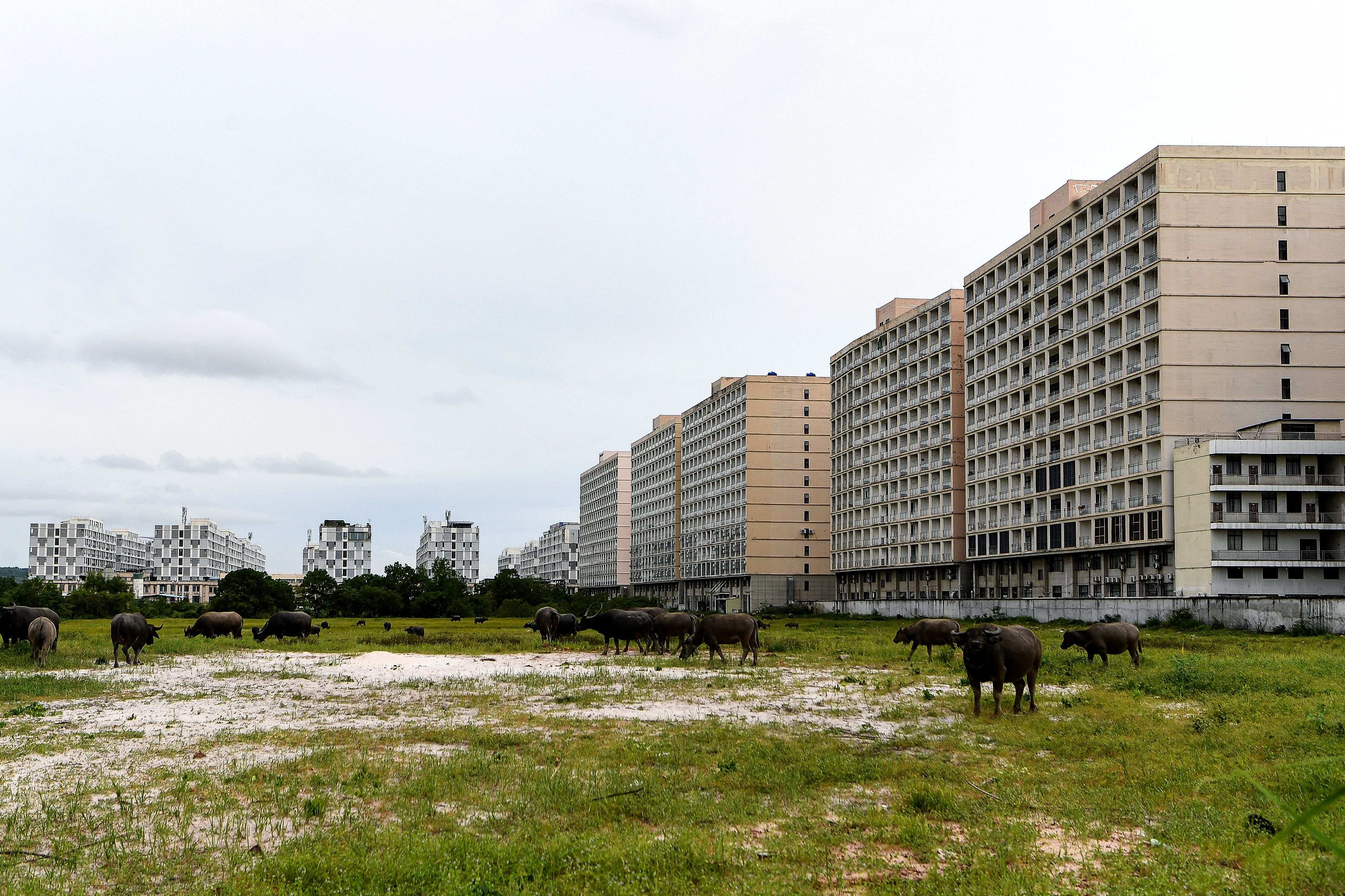
As for Thailand, it is traditionally a destination for trafficking in persons. But over the past few years, it has become an origin and transit country for trafficking for forced criminality. Thai borders in Tak province’s Mae Sot district and Sa Kaeo’s Aranyaprathet district have been used as crossing points to Myanmar and Cambodia, respectively, for international trafficking victims. Some Thais, including adolescents, are part of transnational cyber scam operations: they are hired to open mule accounts or serve as nominees to foreign illegal businesses in Thailand.
The physical nature of border towns facilitates cyber scam operators, traffickers and smugglers because these areas never sleep. Despite checkpoints and surveillance, almost everyone can still travel back and forth between the two countries on foot. “Sometimes, [criminals] take a chance to deceive people on the other side or get around. They also benefit from Thailand’s infrastructure, such as electricity, the Internet, etcetera. So, cyber scam operations always live on thanks to these advantages in border areas,” Assoc. Prof. Dr. Dulyapak Preecharush, Southeast Asian studies lecturer of Thammasat University, explained on a Thai PBS online program in October 2025.
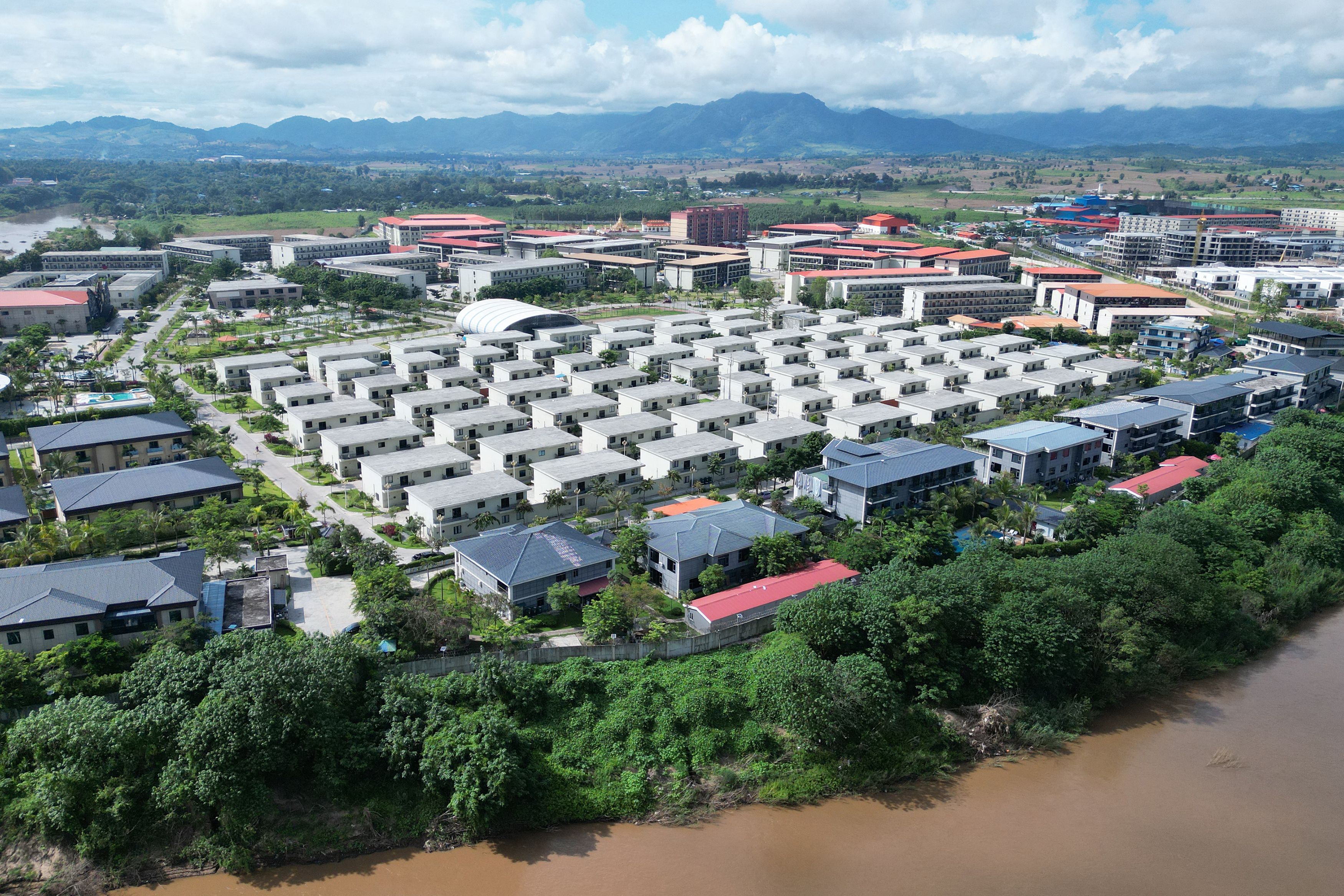
While Cambodia, Myanmar and Thailand are protagonists in ASEAN’s scam issues, the situations in Malaysia and the Philippines are getting more alarming as well. In the first quarter of 2025 alone, Malaysia recorded 12,110 online scam cases involving fraud such as fake e-commerce offers, bogus loans, and nonexistent investment schemes, resulting in total losses of RM573.7 million. Despite having no specific locations, organized crime activities spread across the country, in Langkawi, Johor and various other areas.
The Philippines also faces growing threats of cyber scam operations. Last year, 14,531 cyber-related complaints were filed with the PNP Anti-Cybercrime Group: 44 percent of those cases concerned online scams. Criminal networks in the country have expanded under the cover of ex-POGOs, or Philippine Offshore Gambling Operators, which are being completely banned by President Ferdinand R. Marcos Jr. Several POGO complexes house illicit activities related to cyber fraud, human trafficking and money laundering. Some scan hubs fish Filipinos on social media groups labeled as “POGO work abroad,” offering overseas jobs in so-called call centers with attractive salaries, plus free meals and accommodation.
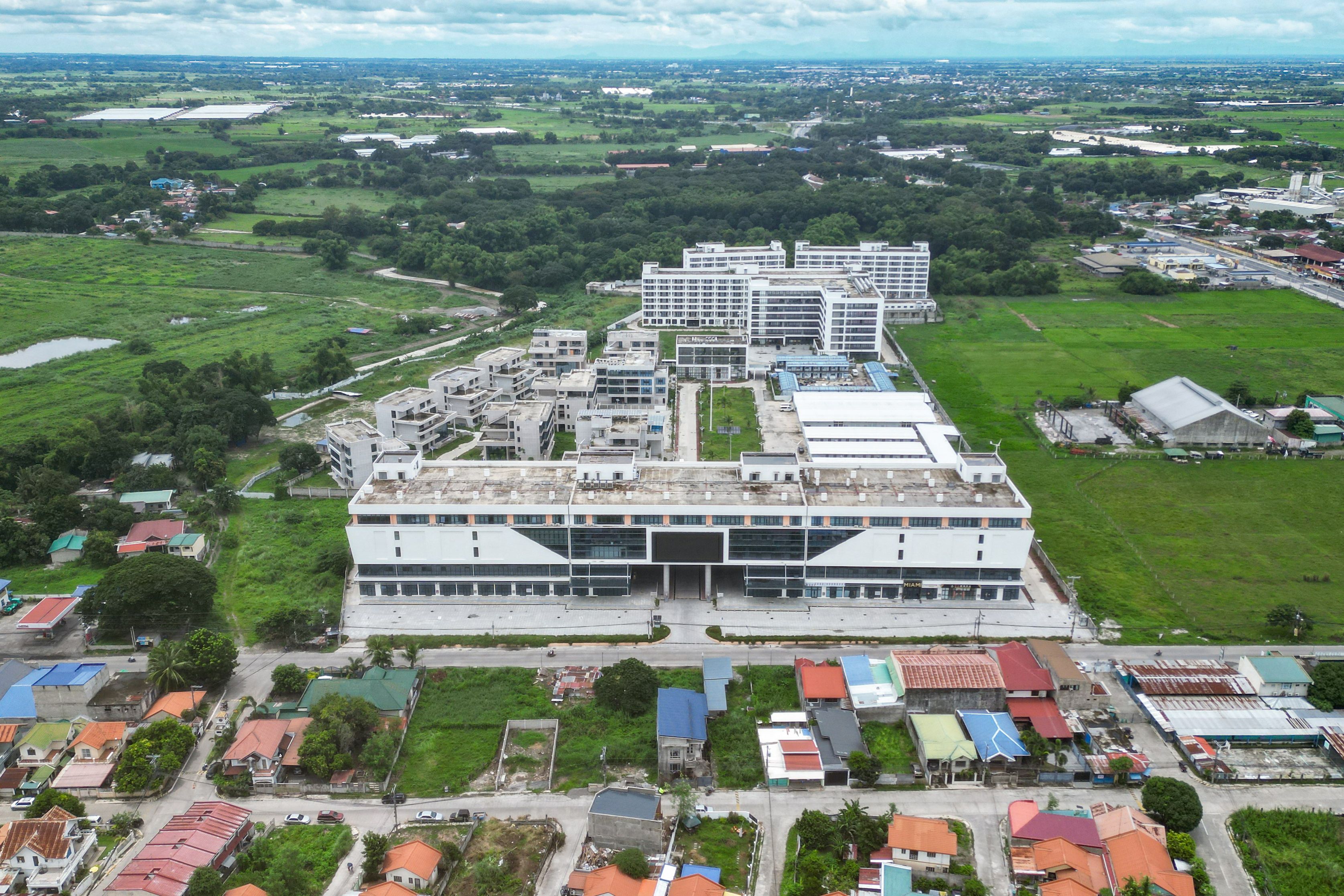
In addition, Eastern and Southeast Asian crime syndicates have expanded their operations in other regions, targeting both local and international victims. For instance, the UAE has been identified as a hub for money laundering of funds, as well as “recruitment and trafficking linked to the cyber-enable fraud industry.” Some Southeast Asians have been tricked by Dubai-based Asian scam networks into working in Peru or Nigeria. While local scam industries have long existed, Nigeria is now an emerging destination for Asian fraud rings entering the African continent.
Brazil is another country encountering rising challenges related to cybercrime. Despite efforts to decriminalize and regulate online gambling platforms, some illegal ones, related, run or owned by Asians, manage to reach Brazilian bettors and players from abroad. In August 2024, one illicit operation located in Angola had more than 400 online games: many of which were embedded with malware designed to harvest users’ data. More Brazilian nationals also fall victims to job scams and trafficking for forced criminality, ending up working in call center compounds in Myanmar or elsewhere in Southeast Asia.
Cyber scam operations have therefore become a new form of threat to international security. No country should definitely be reluctant to solve and prevent transnational fraud rings. The question is: how willing and cooperative are ASEAN countries to deal with the issues within their region?
Safeguards and watchdogs on cyber scam operations
As cyber scam operations based in Southeast Asia have caused losses worldwide, major countries are retaliating against these criminal groups. This year, to protect its citizens from being further exploited, the U.S. sanctioned several targets, individuals and entities involved in Shew Kokko’s online fraud operations and Cambodia’s forced labor compounds. The U.S. also coordinated with the U.K. to impose sweeping sanctions on targets within the Prince Group Transnational Criminal Organization while severing the Cambodia-based financial services conglomerate, Huione Group, from the American financial system.
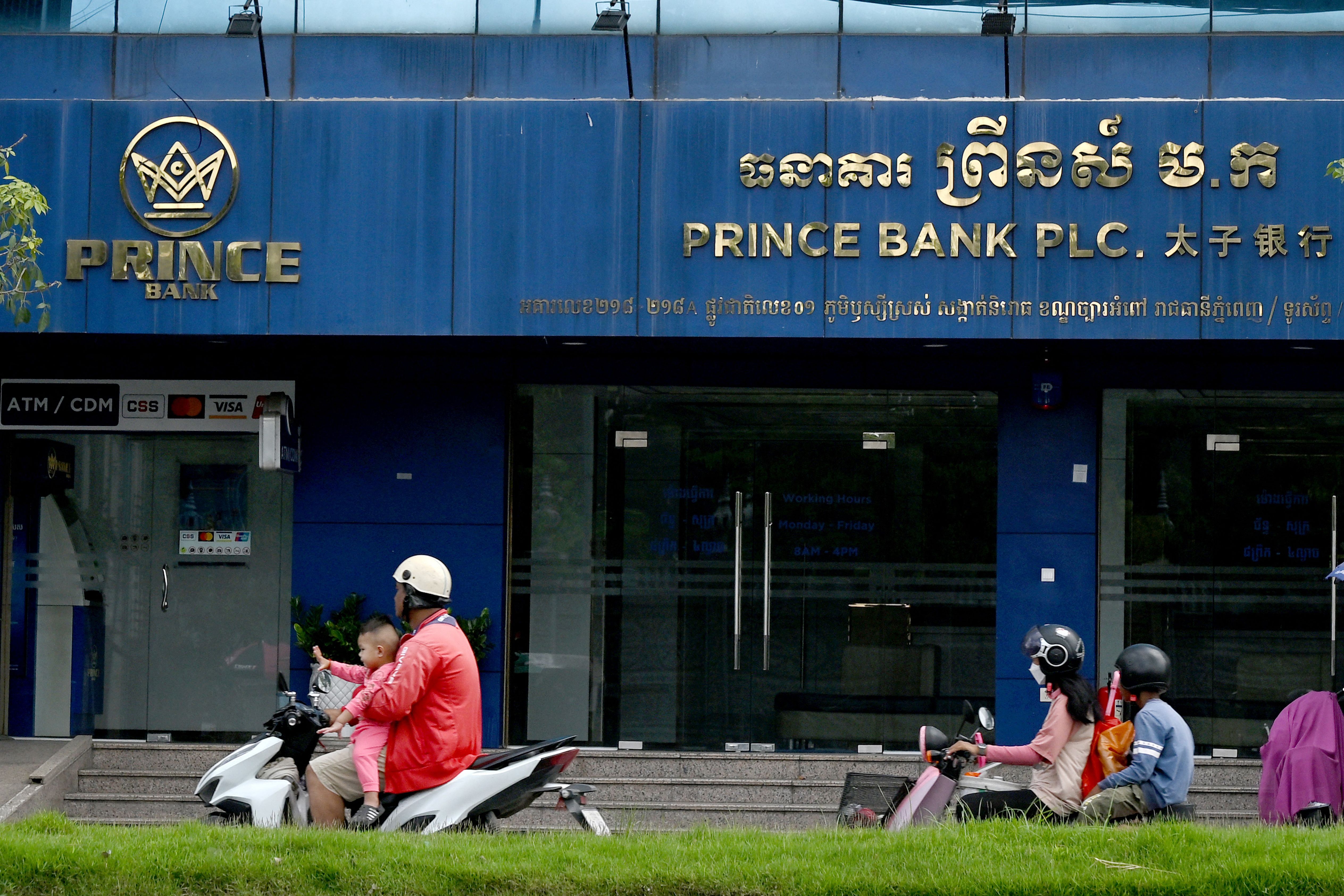
Likewise, China is taking actions against overseas Chinese gangs ripping off their compatriots. In early November, the country sentenced top five mafia members, including two from the infamous Bai family, to death while imprisoning 21 Bai family members and associates for fraud, homicide and other related offenses. As for South Korea, last October it proceeded the repartition of its citizens – abducted, forcefully detained, or willingly engaged in illegal activities – back from Cambodia after the death of a student there. Seoul also vowed to join forces with ASEAN nations so that they suppress transnational cybercrime networks.
For its part, ASEAN has been reaffirming its commitment to tackle the rise of online scam empires and trafficking rings in the region through frameworks such as the ASEAN Plan of Action in Combatting Transnational Crime, the ASEAN Declaration on Countering People Smuggling in Southeast Asia and the ASEAN Declaration on Combatting Cybercrime and Online Scams. Raids, often in collaboration with other countries, have been realized as well on several scam hubs to cut the resources, arrest criminals or rescue international victims.
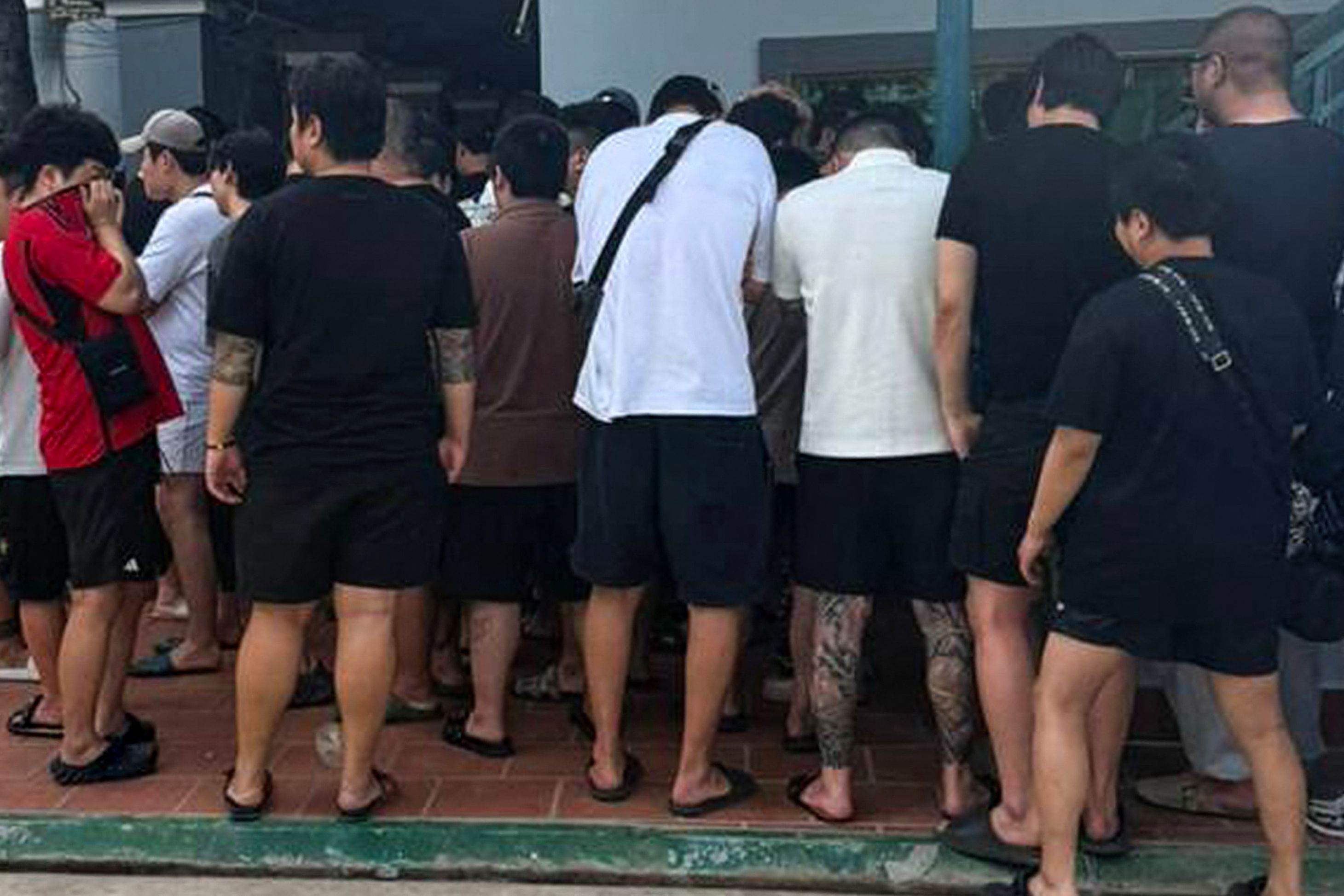
However, some question the effectiveness of these regional efforts, as many scam compounds are still active and manage to adapt with new strategies. Assoc. Prof. Dr. Dulyapak has identified three main obstacles to combat online fraud operations in ASEAN countries, which are non-interventionism, a lack of punitive law and a deficiency in good governance across the region.
I think actions can be achieved from time to time, but it is difficult to get to the roots and durably solve these problems. […] There is no penal code to punish a state member where transnational crimes have been committed. So, things will remain this way, as always. - Assoc. Prof. Dr. Dulyapak Preecharush
Regardless, authorities alone cannot simultaneously tackle transnational crime organizations and build public awareness. This is where the media takes part in this combat. Not only are news outlets and production studios able to encourage media literacy and skepticism among the people, but they can also ask governments about measures and policies to end the scam pandemic, both domestically and regionally.
“These scam cases are so frequent. Sometimes when it's on the news, people would just, like, ‘okay, another scam case.’ So, you have to find a nuanced way of retelling the news and writing the story so that the people can be more receptive to it because you don't want to lecture people,” said Muhammad Haziq Zahid, English News Editor from Radio Televisyen Malaysia (RTM) and a 2025 Thai PBS Fellow. “Instead of letting the authorities speak, we [take] it on ourselves. We have to play around a lot with nuances in wording to attract their attention first. And then afterwards, you can start to slowly weave in the messages.”
Zahid further mentioned an “unspoken kind of collaboration” between state-owned and commercial media regarding scam combats in his home country. “For us, RTM, we are the government, state-owned media. So, we do awareness campaigns and have collaboration with MCMC [Malaysian Communications and Multimedia Commission]. We do our part to promote the policy, and the private media comes in to question [on behalf of the people such as] ‘Has the cooperation between the ASEAN countries been realized or not?’ or ‘Is this policy tangible?’”
So, collaboration is, I think, the key here to actually combat this issue. – Muhammad Haziq Zahid

John Marwin Elao, Social Media Producer at Philstar Global Corp. and another Thai PBS Fellow, also talked about collaboration among media outlets to help tackle scam issues: “In my news organization, we conduct series in partnership with other news organizations in the Philippines. We conduct caravans or series of campaigns at universities to talk about disinformation [and] what's happening in the Philippines. I think we're not competing with one another, but we aim to help people understand what's happening in the country, in the world.”
Basically, news is a public service. Being a journalist [means] being the watch [on] the government. - John Marwin Elao
Dramatization is another way to raise public awareness of cyber scam operations and their new schemes. As many Filipinos have fallen victim to fake overseas work opportunities, there have been some scripted series based on real-life cases. “We have [a] TV network that is showing a drama based on a real-life woman [trapped in a Myanmar scam hub]. And then it got good reactions from the people,” Elao gave an example. “So, it raised more awareness that these scams happen and people should not fall for this, especially for our RFWs [remote Filipino workers] who dream of leaving the country for better work or better opportunity.”
As for Thailand, media outlets and their partners join forces to encourage digital literacy among the people. For example, the Central Investigation Bureau (CIB) and news agencies have, together, held on-campus activities for students nationwide. Apart from fact-checking, Cofact and Thai PBS Verify update new scam tactics for public awareness. The country’s public media service also has a hotline to help scam victims get justice, as well as a data visualization unit which tells complex stories, such as cyber scam operations, more comprehensively and more interactively via multimedia.
Cyber scam operations have now become one of the world’s biggest threats to international security. Actions and measures are indispensable to dismantle these criminal networks based or originating in ASEAN countries. However, at the end of the day, honesty, commitment and coordination are keys to prevent further damage sustainably.
Dig deeper on how cyber scam operations work with “THE SCAMMER CLICK • PAY • CRY” data visualization project by The Visual: www.thaipbs.or.th/thevisual/en/dataviz/thescammer

References | อ้างอิง
- AI Guidelines, Training Programmes Among Proactive Measures By The Ministry Of Digital To Combat Online Scams, Ministry of Digital (Malaysia) [August 5, 2025]
- Casinos, cyber fraud, and trafficking in persons for forced criminality in Southeast Asia – Policy Report, United Nations Office on Drugs and Crime (UNODC) [September 2023]
- China sentences infamous Myanmar scam mafia members to death, BBC [November 4, 2025]
- Combating Scam Syndicates in Malaysia and Southeast Asia, Penang Institute [March 19, 2025]
- Imposing Sanctions on Online Scam Centers in Southeast Asia, U.S. Department of State [September 8, 2025]
- Joint Statement the Nineteenth Asean Ministerial Meeting On Transnational Crime (19th AMMTC) [September 10, 2025]
- PBBM signs into law Anti-POGO Act of 2025, institutionalizing ban on POGOs, Presidential Communications Office [October 29, 2025]
- Scam hubs abroad with ‘POGO-like’ operations continue to recruit Filipino victims —BI, The Bureau of Immigration [February 19, 2025]
- U.S. and U.K. Take Largest Action Ever Targeting Cybercriminal Networks in Southeast Asia, U.S. Department of the Treasury [October 14, 2025]
Content Creator: Peerachai Pasutan
Contributors: Muhammad Haziq Zahid and John Marwin Elao
Videographers: Phuresaphon Jantapoon and Anongnat Yimsawad
Video Producer: Kantida Kunnapatee
Special Thanks: Kanokporn Prasitphon, Clare Patchimanon, Ruthai Thamsatha, Supanee Santiphong and Sippakorn Srisarutwasara
